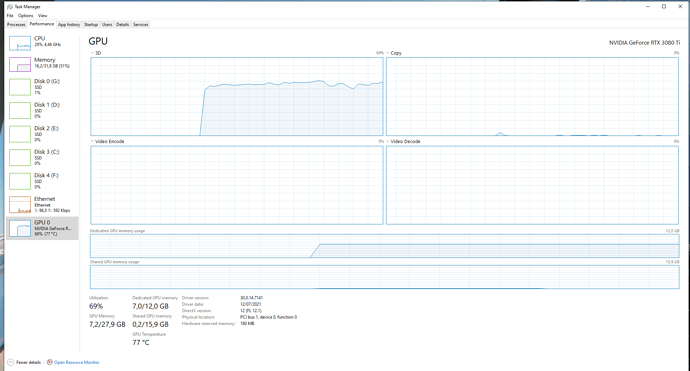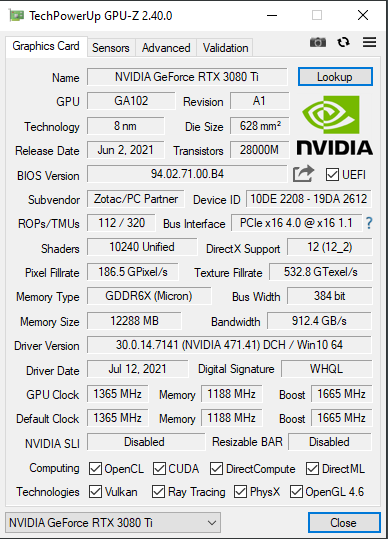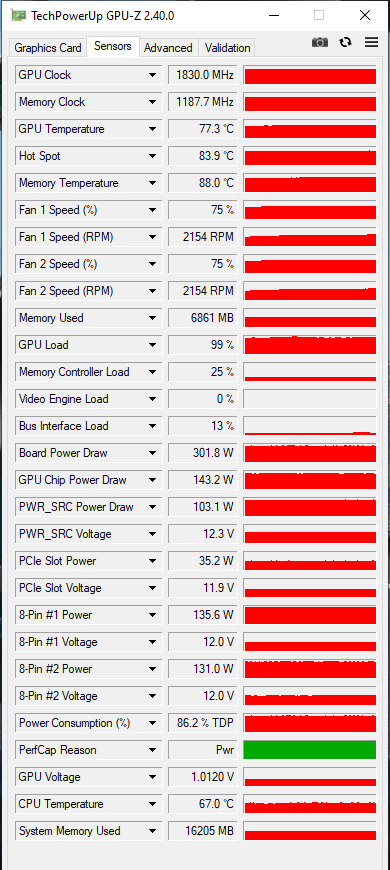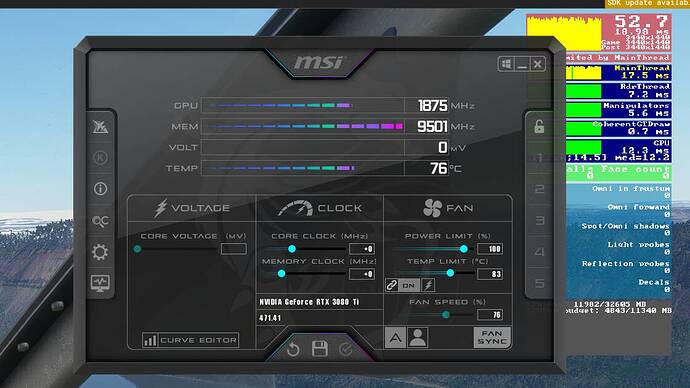Hi all
I have just bought a brand new zotach 3080 ti trinity non oc version.
According to zotach spec. It’s boost clock should be 1665 MHz.
But it is actually running at 1875 MHz at full load in msfs, how wierd is that. But it runs great and smooth 100 Taa 90 oxr allmost all settings ultra.
I havent overclocked the card in any Way, and i am running nvidia Driver ver. 471.41. I Have double checked core clock speed in gpu-z and msi afterburner and yes it’s at 1875 MHz. Any good explanations for that?
Its a brand new win 10 installalation, so there could not be any left over settings form previus.
1 Like
Your OC’d ram may be responsible … I would tweak it down a bit just for safety.
But i havent done nothing regarding to oc, Just installed card and driver?
You Can se in msi ab that memory is at Stock
The ratio will be different to your old card
My Old card was an 2070 wich never have ben oc, brand new Win 10 indtastallation!
Never mind new Windows, your bios controls base clock.
Do you mean mb bios?
My memory is running xmp profile 3200 MHz just as intended. Mb is asus tuf z590
So is this a god or bad thing, do i ned to adjust something
Well then I can’t help you … Your gpu, your risk but maybe you should try other software to check it’s not just a duff reading.
Wich software should i use then
HW Monitor from the CPUID website
Don’t think it’s anything to worry about. My regular 3080 FE boosts to over 1900MHz despite the specs saying 1710.
Plenty of reviews show the same thing as well.
3 Likes
Ok. Just wandering… then it doesent make any sence to bye an oc version of the card?
Yeah that makes sense too, Zotac probably just covering their backsides
Guys, do some reading on nVIDIA GPU boost, this behaviour is entirely normal. As long as neither temperature target, power target or voltage limits are reached, the GPU will increase the clock speed. Means: depending on those factors, the one and same graphics card might boost to different levels in different rigs.
Due to the logic of the GPU boost, it might be worth looking into undervolting. If you got a good card, you might be able to reduce the max. voltage without loosing to much clock speeds but getting a cooler and thus more silent GPU.
But for sure it has NOTHING to do with the system RAM…
1 Like
Yes, this.
Undervolting is pretty great if you care about heat, power draw or noise – of course, the three are closely linked (two could be argued to be the same thing) but different ways to look at it.
My 3080 draws about 320-330 W stock and about 230-240 W undervolted. That costs me almost no performance, either: in Red Dead 2, very GPU-bound, I went from 126.8 fps to 124.5 fps.
In that particular case power went from about 310 W to 220 W.
Occasionally the power draw is a bit higher (I’d say 220-240 is most common in MSFS though) but always a decent bit below 320 W.
Well that sounds resonable, my gpu power draw was 300-320 watt and peak temp 82 degrees, so it seems to be a good idea to try undervolting,
Agree now I know it’s normal behaviour but it’s a fact that unless a board is designed not to then overclocking ram will also raise processor and FSB frequencies, at least that’s how it used to work and even now when I raised my PC-3200 up to 4400MHz my CPU also got a healthy whack well beyond it’s usual boost clock. I must admit I never even checked the gpu before trimming the ram back to a more healthy 4000.
I Foundation this article wich explains it all.



